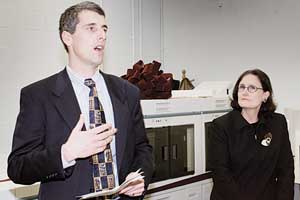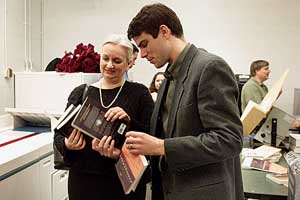University Press now operating first short-run digital print facility
By Seth SandersNews Office
 Members of the University Press staff gathered recently at the press’s Pullman site to mark the opening of its Chicago Digital Distribution Center, which is funded by a $1.5 million Andrew W. Mellon Foundation grant. |
Already the largest of university presses in America, the University Press has recently expanded into a new domain. On Wednesday, Nov. 28, the University Press officially opened its Chicago Digital Distribution Center.
Using a $1.5 million grant from the Andrew W. Mellon Foundation, the center comprises both the first short-run digital print facility operated through an American university press and the BiblioVault, an electronic repository for backlist and current university press titles.
“We are delighted to be able to join with a large segment of the university press community in making available to scholars and libraries the books that might otherwise be declared out of print,” said Paula Barker Duffy, Director of the University Press. “These are difficult times for publishers in all segments of the industry. Mellon’s support for new printing and online technologies will enable us to continue to provide the content that universities and their presses have invested in over the years. And we are excited about the prospect of developing a versatile repository for digital files of books.”
 |
The 18-month grant will support the development of the Chicago Digital Distribution Center and the BiblioVault as well as the preparation of 5,000 books for short-run digital printing and, eventually, online searching. The CDDC will serve not only Chicago but also the many scholarly presses involved in the Chicago Distribution Center, enabling these presses to print small quantities of books, a practice that is not economically feasible with standard printing methods.
The short-run printing facility will have an initial capacity of 36,000 books a year, allowing it to keep books with low demand available and bring back out-of-print titles as demand warrants, ensuring access to texts critical to research and teaching.
In the future, the BiblioVault will make books electronically available to scholars online and enable publishers to deliver their books to scholars in new ways as technologies evolve. The grant also will allow the CDDC to develop a strategic intellectual property management system that will benefit scholars and publishers.
Martin Runkle, Director of the University Library, is excited about the project’s import for university libraries as much as for university presses. “This initiative provides hope that there will be an acceptable delivery structure for monographs throughout their useful lives and in formats that bring scholars to material valuable to their work,” said Runkle. “As technologies change, it is important that presses change with them to keep ideas circulating among readers.”
![[Chronicle]](/images/small-header.gif)